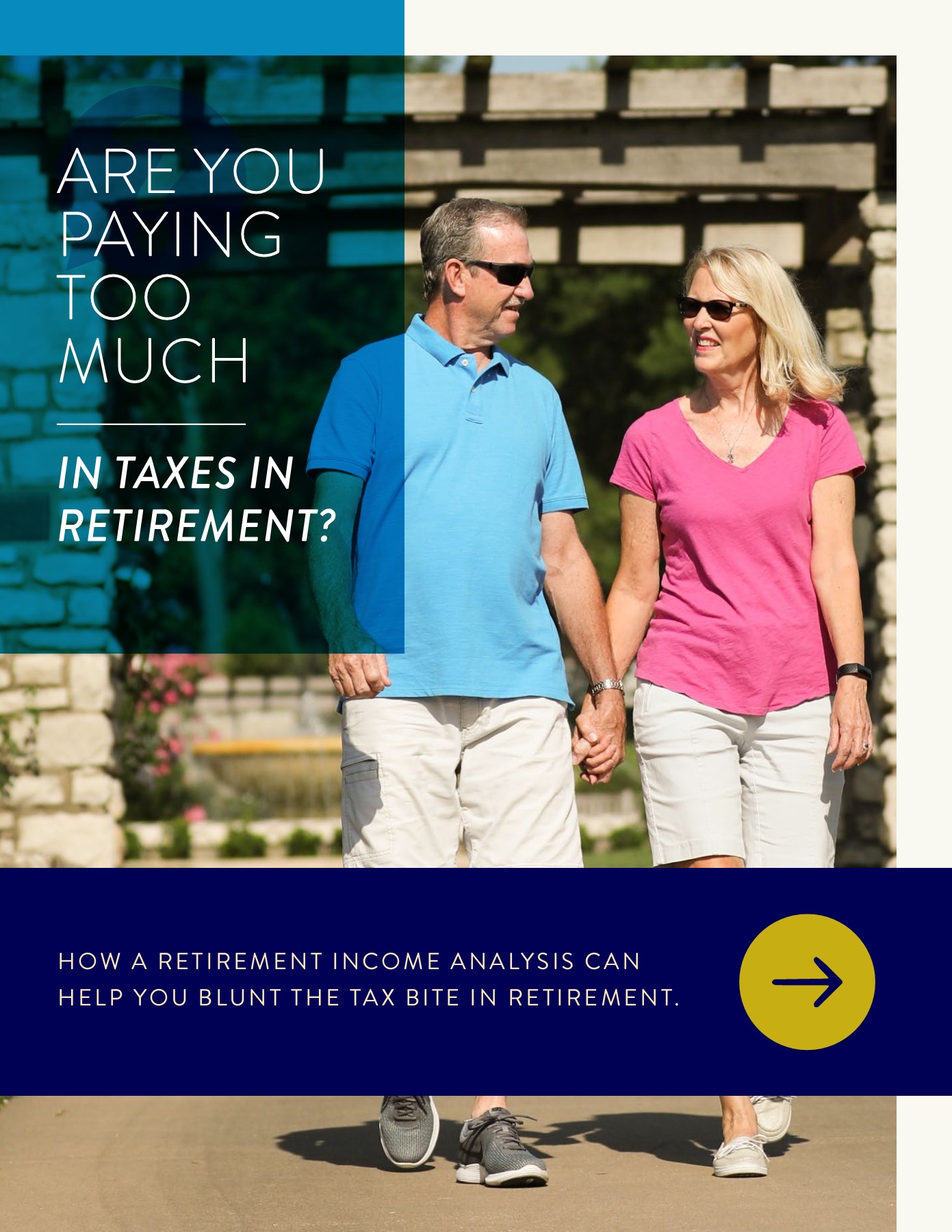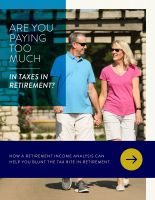
Are You Paying Too Much in Taxes in Retirement?
You’ve worked hard to build your retirement savings, but have you thought about how much of it you’ll get to keep after taxes? Unfortunately, many retirees pay more in taxes than they expected simply because they didn’t plan ahead. Without a retirement income plan, taxes can eat into your hard-earned savings and disrupt your lifestyle in retirement.
The good news is that with the right strategy and professional guidance, you can take control of when and how much you pay in taxes, rather than letting the government decide for you.
Retirement Isn’t a Tax-Free Zone
Many people assume their tax burden will be less once they stop working, but that’s not always the case. Income from retirement accounts, Social Security, pensions, and other sources can still be taxable. In addition, if you’ve built up a sizable nest egg, your total income might exceed what you earned while you were working, potentially pushing you into a higher tax bracket.
The longer you delay tax planning, the fewer chances you’ll have to minimize your future tax burden. A financial professional can help you understand and navigate your tax situation and the current tax brackets while keeping you on track to meet your retirement goals.
Act Now, Save on Taxes Later
Taking a proactive approach to tax planning can help extend the lifespan of your retirement paycheck. Whether retirement is right around the corner or five years away, there is still time to start implementing tax-efficient strategies into your financial plan.
Once you retire, your financial focus must shift from growing your savings to generating a reliable income stream. How and when you choose to withdraw your money can significantly impact your tax obligation, so it’s crucial to get the timing right.

Get Your Full Guide Now
Tax-Smart Strategies to Consider
The first step is identifying how each source of income is taxed. Determine which of your accounts hold taxable, tax-free, or tax-deferred funds to better understand how they interact within the context of your overall financial plan. For example, withdrawals from a Roth IRA are tax-free, while withdrawals from a traditional IRA or 401(k) are fully taxable as income.
You may find, in working with a financial professional, that staggering your withdrawals and spreading your tax liability over several years can help minimize the tax bite. If you’re still a few years from retirement, another tax-wise solution could be to use a Roth conversion or direct future savings to a Roth account.
What You Can Do Today
Don’t let taxes derail your retirement dreams. Although we don’t know exactly what the future holds, it’s important to be prepared with a personalized strategy for your unique tax situation. Start your journey to tax efficiency today with our free booklet, Are You Paying Too Much in Taxes in Retirement? This educational guide can be a valuable resource along the way, helping you avoid potential tax traps and offering actionable steps to build tax-smart strategies into your financial plan.
Information presented in our podcasts is considered current as of the created date. Over time, some information presented may become stale. We recommend you consult with your Financial Professional before making any changes based on information contained here.
Johnson Brunetti is a marketing name for the businesses of JB Capital and JN Financial.
Investment Advisory Services offered through JB Capital, LLC. Insurance Products offered through JN Financial, LLC.
The guarantees provided by any type of insurance contract are based on the claims-paying ability of the insurance company.
Related Resources
-
Staying Ahead of the Tax Curve
Retirement doesn’t mean you stop paying taxes – but there are ways to minimize the bite in the long run. With thoughtful, proactive tax planning, you can stay ahead of the curve and keep more of w… -
What’s the Best Age to Start Taking RMDs?
Is it better to take your required minimum distribution (RMD) sooner rather than later? While the IRS determines when you must begin taking RMDs, you may benefit from taking them earlier. An RM… -
Podcast 407: Is My Social Security Income Taxable?
Prefer to watch? Click here to watch and listen on YouTube. A common misconception about Social Security is that whether your benefits are taxed depends on the state you live in. While state ta… -
Avoiding the Retirement Tax Trap
Once you retire, understanding your tax implications becomes even more crucial. After all, taxes don’t disappear in retirement. In fact, as you begin withdrawing from your retirement savings, you … -
Podcast Episode 405: The Retirement Tax Trap
Prefer to watch? Click here to watch and listen on YouTube. The term “tax trap” comes from the misconception that you’ll need less income in retirement, so you’ll pay lower taxes. This leads ma… -
What Should I Watch Out for When Reviewing My Retirement Tax Return?
Now that tax season is over and your return is filed, you may be wondering what you need to review in preparation for next year, especially if you’re approaching retirement. In this week’s Mone… -
How Does a Tax Return Work?
As tax season concludes, it’s a good time to refresh your tax knowledge. In this week’s Money Wisdom Question Series, Ian Fergusson, RICP® discusses how filing your taxes works and why it’s essen… -
Finding Your Way on Taxes
Taxes can be confusing on any given day, but in retirement, they require even more attention and understanding. In fact, taxes are at the core of nine out of every ten conversations we have with t… -
How Will My Retirement Account Withdrawals Affect My Taxes?
Retirement income planning requires thoughtful decision-making, especially when it comes to minimizing the amount you’ll pay in taxes. In this week’s Money Wisdom Question Series, join Jake Dos… -
How to Prepare for Taxes in Retirement
No matter how well you’ve saved for retirement, taxes are an unavoidable part of the process. The good news is that with the proper tax planning, you can minimize this burden and keep more of what…

